Keondo Park
AI Should Sense Better, Not Just Scale Bigger: Adaptive Sensing as a Paradigm Shift
Jul 10, 2025Abstract:Current AI advances largely rely on scaling neural models and expanding training datasets to achieve generalization and robustness. Despite notable successes, this paradigm incurs significant environmental, economic, and ethical costs, limiting sustainability and equitable access. Inspired by biological sensory systems, where adaptation occurs dynamically at the input (e.g., adjusting pupil size, refocusing vision)--we advocate for adaptive sensing as a necessary and foundational shift. Adaptive sensing proactively modulates sensor parameters (e.g., exposure, sensitivity, multimodal configurations) at the input level, significantly mitigating covariate shifts and improving efficiency. Empirical evidence from recent studies demonstrates that adaptive sensing enables small models (e.g., EfficientNet-B0) to surpass substantially larger models (e.g., OpenCLIP-H) trained with significantly more data and compute. We (i) outline a roadmap for broadly integrating adaptive sensing into real-world applications spanning humanoid, healthcare, autonomous systems, agriculture, and environmental monitoring, (ii) critically assess technical and ethical integration challenges, and (iii) propose targeted research directions, such as standardized benchmarks, real-time adaptive algorithms, multimodal integration, and privacy-preserving methods. Collectively, these efforts aim to transition the AI community toward sustainable, robust, and equitable artificial intelligence systems.
Unexplored Faces of Robustness and Out-of-Distribution: Covariate Shifts in Environment and Sensor Domains
Apr 25, 2024



Abstract:Computer vision applications predict on digital images acquired by a camera from physical scenes through light. However, conventional robustness benchmarks rely on perturbations in digitized images, diverging from distribution shifts occurring in the image acquisition process. To bridge this gap, we introduce a new distribution shift dataset, ImageNet-ES, comprising variations in environmental and camera sensor factors by directly capturing 202k images with a real camera in a controllable testbed. With the new dataset, we evaluate out-of-distribution (OOD) detection and model robustness. We find that existing OOD detection methods do not cope with the covariate shifts in ImageNet-ES, implying that the definition and detection of OOD should be revisited to embrace real-world distribution shifts. We also observe that the model becomes more robust in both ImageNet-C and -ES by learning environment and sensor variations in addition to existing digital augmentations. Lastly, our results suggest that effective shift mitigation via camera sensor control can significantly improve performance without increasing model size. With these findings, our benchmark may aid future research on robustness, OOD, and camera sensor control for computer vision. Our code and dataset are available at https://github.com/Edw2n/ImageNet-ES.
Federated Semi-Supervised Learning with Prototypical Networks
May 30, 2022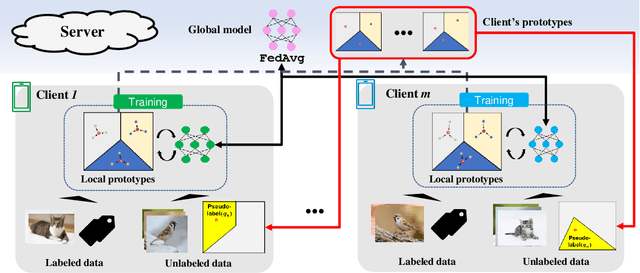

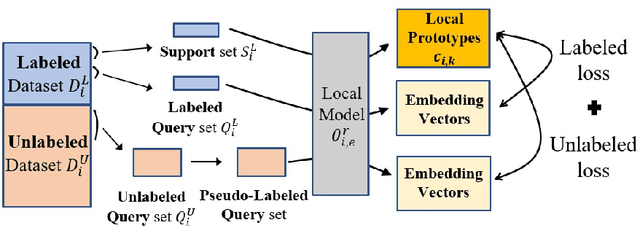
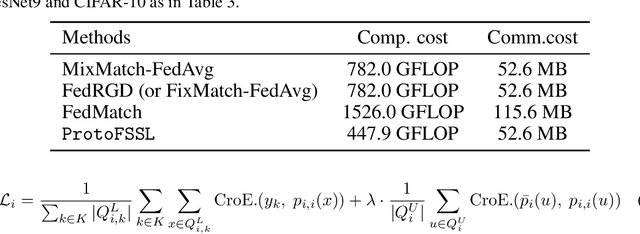
Abstract:With the increasing computing power of edge devices, Federated Learning (FL) emerges to enable model training without privacy concerns. The majority of existing studies assume the data are fully labeled on the client side. In practice, however, the amount of labeled data is often limited. Recently, federated semi-supervised learning (FSSL) is explored as a way to effectively utilize unlabeled data during training. In this work, we propose ProtoFSSL, a novel FSSL approach based on prototypical networks. In ProtoFSSL, clients share knowledge with each other via lightweight prototypes, which prevents the local models from diverging. For computing loss on unlabeled data, each client creates accurate pseudo-labels based on shared prototypes. Jointly with labeled data, the pseudo-labels provide training signals for local prototypes. Compared to a FSSL approach based on weight sharing, the prototype-based inter-client knowledge sharing significantly reduces both communication and computation costs, enabling more frequent knowledge sharing between more clients for better accuracy. In multiple datasets, ProtoFSSL results in higher accuracy compared to the recent FSSL methods with and without knowledge sharing, such as FixMatch, FedRGD, and FedMatch. On SVHN dataset, ProtoFSSL performs comparably to fully supervised FL methods.
Real-time Mask Detection on Google Edge TPU
Oct 09, 2020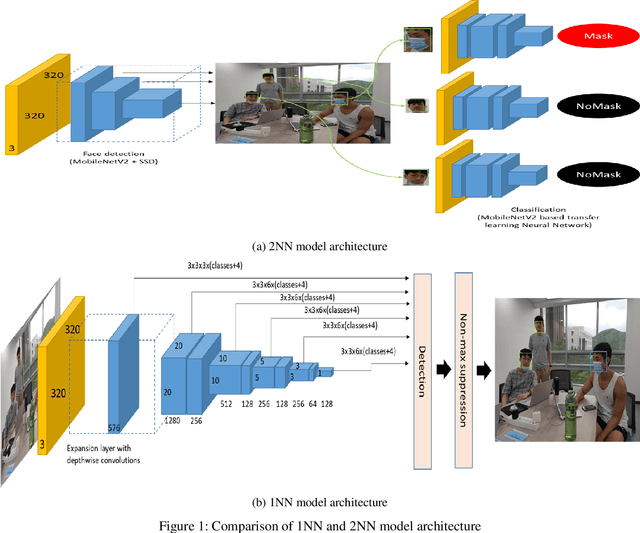

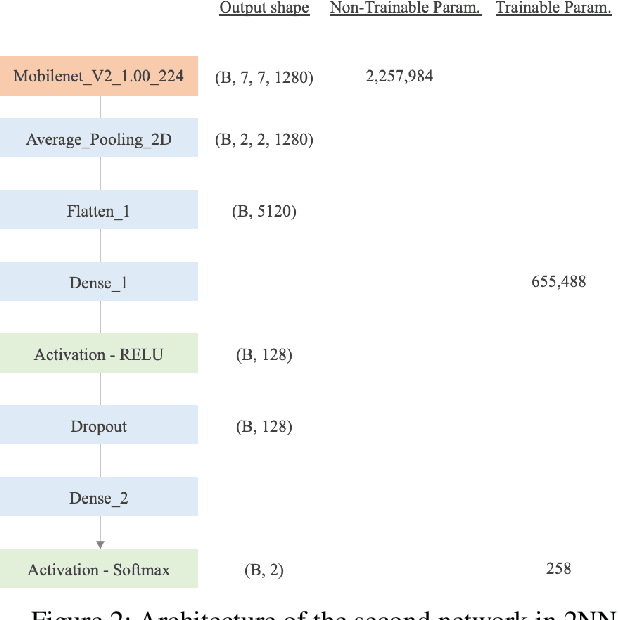
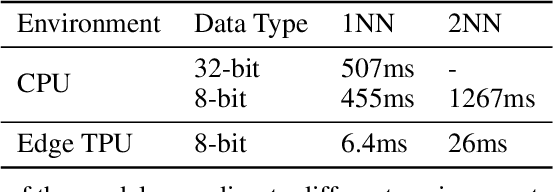
Abstract:After the COVID-19 outbreak, it has become important to automatically detect whether people are wearing masks in order to reduce risk of front-line workers. In addition, processing user data locally is a great way to address both privacy and network bandwidth issues. In this paper, we present a light-weighted model for detecting whether people in a particular area wear masks, which can also be deployed on Coral Dev Board, a commercially available development board containing Google Edge TPU. Our approach combines the object detecting network based on MobileNetV2 plus SSD and the quantization scheme for integer-only hardware. As a result, the lighter model in the Edge TPU has a significantly lower latency which is more appropriate for real-time execution while maintaining accuracy comparable to a floating point device.
 Add to Chrome
Add to Chrome Add to Firefox
Add to Firefox Add to Edge
Add to Edge